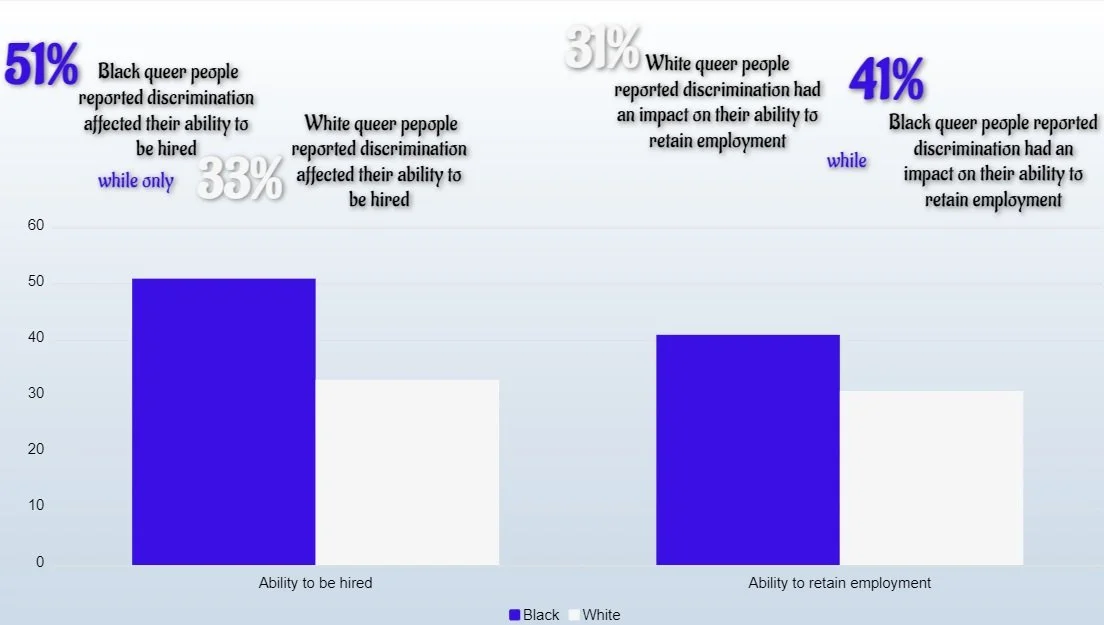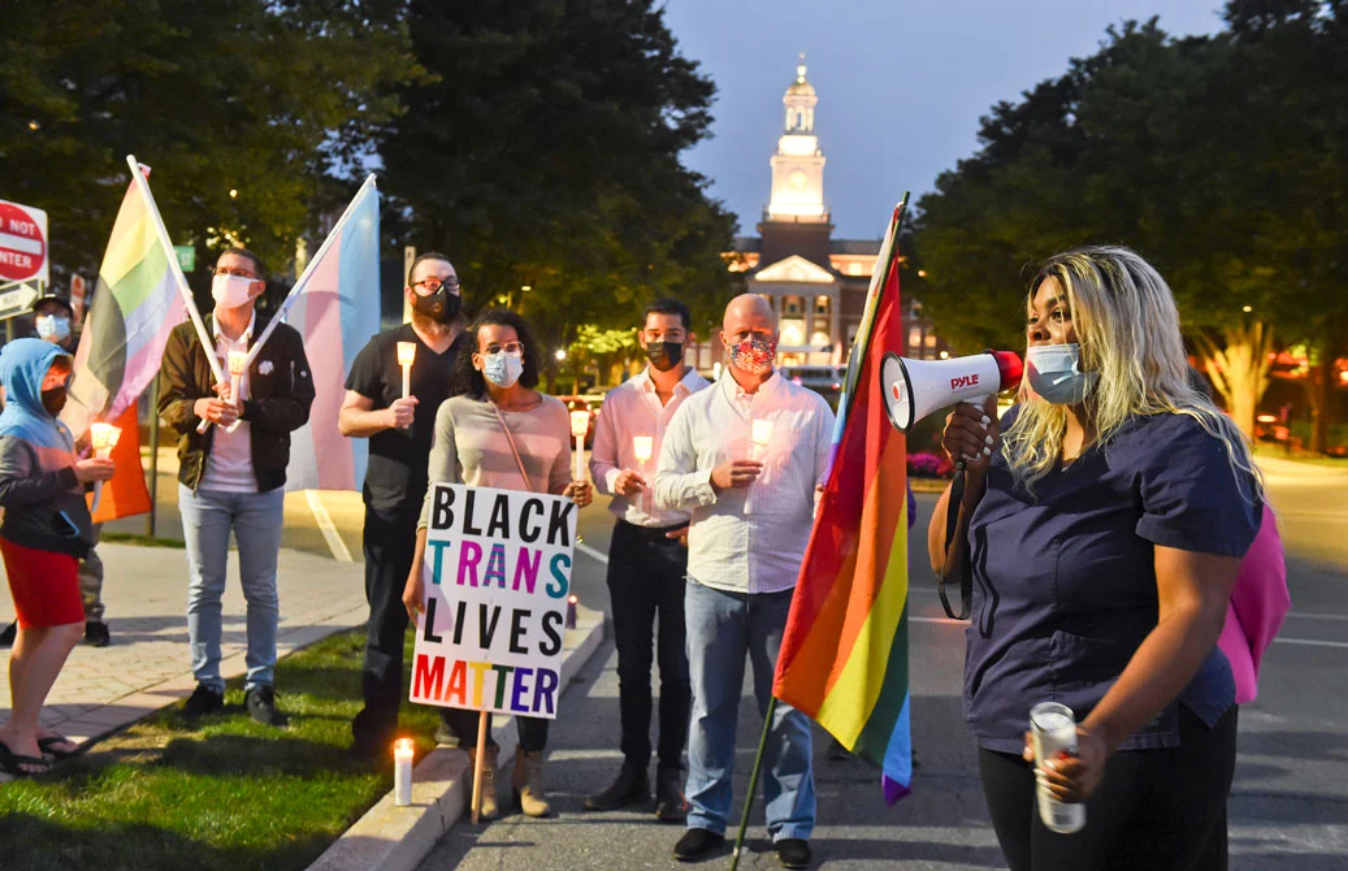The Blackness of Queer Lives Matter
Noah Eleazar/ Unsplash
Loud, wailing sounds echoed from the sirens of police cars as Alexandria Williams demanded inclusion through a mid-sized megaphone in the sweltering heat of a summer day in downtown Toronto in 2016, according to CBC.
Williams, the co-founder of Black Lives Matter Toronto, told CBC that “Pride Toronto as an organization has constantly been pushing Black folk in terms of their programming.”
“So today we held Pride responsible for their anti-Blackness, for their anti-indigeneity, for the fact that we have been pushed to the margins way too long,” she said.
CBC reported that members of BLMTO halted the Pride parade on July 3, 2016, holding up the marching for about 30 minutes.
Members of BLMTO sit on the ground to halt the annual Pride parade in Toronto on Sunday, July 3, 2016. (THE CANADIAN PRESS/ Mark Blinch)
Among the removal of police floats from the forthcoming annual parades, Pride Toronto’s executive director Mathieu Chantelois signed a document agreeing to several demands towards a more inclusive and safe movement from BLMTO as they staged a sit-in at the parade.
The Queerness of Blackness
The concept of intersectionality, first coined by American civil rights advocate Kimberlé Crenshaw, refers to how different forms of oppression and discrimination intersect and compound one another.
Black queer people face discrimination and prejudice from members of the LGBTQ community based on their race and from other Black people because of their sexuality.
In the Black community, homophobia and transphobia are still prevalent. Black queer people also face rejection from their families and peers.
“I’m the child of Nigerian Christian pastors, so I came out of the closet and had to go back into the closet with them because their immediate reaction was, how can we get him married off to save his soul?” Black queer poet, community artist and geography masters student at the University of Toronto Moboluwajidide Joseph said in an interview.
In the 1990 documentary Paris Is Burning, American drag queen Pepper LaBeija talked about how part of her role as “the Mother” of a ball culture House was to look after queer people who had been thrown out of the house where they grew up. “Because their real parents give them such a hard way to go, they look up to me to fill that void,” LaBeija said.
Moreover, within the LGBTQ community, racism makes it difficult for Black queer people to find acceptance and support.
“As a trans woman, I faced many challenges being Black at the same time,” Christopher Nkambwe, founder of the African Centre for Refugees for LGBTQ+ African newcomers, said.
Nkambwe fled persecution for being transgender and for her work within her local LGBTQ community in Uganda in April 2019. She founded the African Centre for Refugees for LGBTQ+ African newcomers in Toronto after four months in Canada.
“I'm a trans person living in a men's shelter; people would come out and say, you're Black, you're not supposed to be here, your accent is not good, and when they find you in the dining hall, they get around you and start laughing at you for your colour,” Nkambwe said in an interview while narrating her struggles as a Black trans woman and refugee when she first came to Canada.
According to the National Center for Institutional Diversity, writer Audre Lorde described the 1960s political climate as one in which “the existence of Black lesbian and gay people were not even allowed to cross the public consciousness of Black America.”
BLMTO’s disruption of the Pride parade in 2016 was one of the several protests against the exclusion of Black queer people in the fight to protect members of the LGBTQ community and their rights.
The Stonewall Uprising
A routine police raid of Stonewall Inn, a gay bar, launched the initial wave of the gay pride movement in New York City - a series of protests by members of the gay community. According to History, the police raid - The Stonewall Uprising - occurred during the late hours of the night on June 28, 1969.
The Stonewall Uprising was a pivotal moment in the LGBTQ rights movement and is commemorated annually on June 28 as Pride Day and commonly with parades worldwide.
One of the prominent figures in the Stonewall riots was Marsha P. Johnson, a Black trans woman and activist who fought for LGBTQ rights. Johnson's activism was intersectional, advocating for Black and queer rights and other marginalized communities.
Marsha P. Johnson, on the left, hands out flyers to support queer students at New York University in 1970. (REUTERS/ Handout/ New York Public Library-Diana Davies)
The Black Lives Matter movement began in 2013. Three Black feminist women founded it - Alicia Garza, Patrisse Cullors and Opal Tometi - two of whom identify as queer.
Similarly, Black and queer liberation is inextricably linked to resistance against police brutality, as in The Stonewall Riots and the Black Lives Matter movement.
Black Lives Matter has recognized the importance of intersectionality and integrated LGBTQ concerns with slogans such as “Black Trans Lives Matter” into their advocacy.
Despite the significant contributions and leadership of Black queer people in the fight for LGBTQ rights, they’ve often been excluded from the execution of initiatives within the movement.
This exclusion has also manifested in lacking representation and advocacy for Black LGBTQ issues and safe spaces and resources tailored to their needs and experiences.
"They're not giving us a seat at the table, which I feel like is super important,” Beyoncé impersonator, Miss Shalae, told NBC News.
Miss Shalae, who is Black and queer, believes it is time for Black queer people to stop being excluded from the movement for LGBTQ rights.
Black Queer Lives Matter
Black queer people are at higher risk for mental health issues than their white peers. They’re also at higher risk for problems with their physical well-being than their white peers.
A comprehensive survey from the Center for American Progress found that 95 per cent of Black queer people’s psychological well-being was negatively affected by discrimination to some degree. At the same time, the same was the case for only 88 per cent of white respondents.
According to the American Psychological Association, sexual minority individuals are at higher risk for mental health disorders, including depression, anxiety, substance use disorders, and suicidality.
“Half the time, I’m in constant fear that if someone reaches out to me who is family, who I haven't spoken to in a while, I'm like, oh, is this the moment where you've seen maybe a comment I made somewhere, and we're gonna have to talk about queerness?” Joseph said.
The intersections of racism and homophobia also significantly impact the economic well-being of Black queer people. As a result, they face significant economic disparities compared to white queer people, including higher unemployment and poverty rates.
Research shows that Black queer couples have roughly three times higher poverty rates than white queer couples.
Moreover, Black queer people face critical financial challenges due to workplace discrimination based on race and sexual orientation.
“One of my first bosses told me, if you want to have a career as a reporter, you can’t be out at work,” Matthew DiMera, founder and editor of The Resolve, said in discussion with Toronto Metropolitan University queer media students, about the intersection of Blackness and queerness while sharing his struggles as a Black queer person.
Infographic: TMU J-SCHOOL/ DeAndra Asapokhai | Source: Center for American Progress | Created with Genially
Furthermore, Black queer people are at a higher risk of being targeted and mistreated by law enforcement, particularly in cases where their race and sexuality intersect in ways that are perceived as threatening or non-normative.
The United States National Transgender Discrimination Survey reported that 38 per cent of Black queer people who had interacted with the police reported harassment. In comparison, only 18 per cent of their white counterparts said the same.
Additionally, 14 per cent of Black queer people reported they experienced physical assault by the police. Again, in comparison, only four per cent of white queer people said the same.
The intersectionality of the identities of Black queer individuals impacts how they access healthcare and social services. For example, Black queer people face barriers to accessing LGBTQ-friendly healthcare providers or feel uncomfortable seeking care from providers who may not be aware of or sensitive to their needs.
A study in the Am J Public Health journal found that gay Black men who tested negative for HIV experienced more significant stigma and global medical mistrust. Gay Black men who tested positive for HIV also had longer gaps since their last medical appointment due to stigma from healthcare providers.
Similarly, Black queer people face barriers to accessing social services or support programs, as these aren’t always designed with their intersectional identities in mind.
Joseph says society needs to create more safe spaces for Black queer people, especially Black queer femmes, to address and combat discrimination and create a more inclusive and equitable environment.
“There are queer bars, but they're queer male bars; there are no queer female bars, and even within the queer male bars that exist, most of my Black friends do not want to come anywhere near.”
“I can't imagine what it's like to be a Black queer femme,” Joseph said.
“As the founder of the African Center for Refugees for LGBTQ+ African newcomers, we try to create awareness of these sessions through our online program by bringing in different people to speak about gender-based violence, discrimination and racism so that people can understand what they are on to in this new country,” Nkambwe said.
Activists advocate for Black transgender people during a candlelight vigil in West Reading, Pennsylvania, on Monday, Sept. 14, 2020. (Getty/ Ben Hasty)
Black queer people have a unique perspective and experience that can contribute to broader social and cultural discussions. Therefore, their voices and experiences should be valued and supported.
As the LGBTQ community continues to fight for acceptance and representation, Black and queer intersectionality remains a crucial and often overlooked aspect of the struggle.
At the intersection of Blackness and queerness, identity is fluid, complex, and constantly evolving. It’s where the two groups intersect but also where they collide, creating a powerful force for change and resistance in a world that often tries to silence and erase them.






